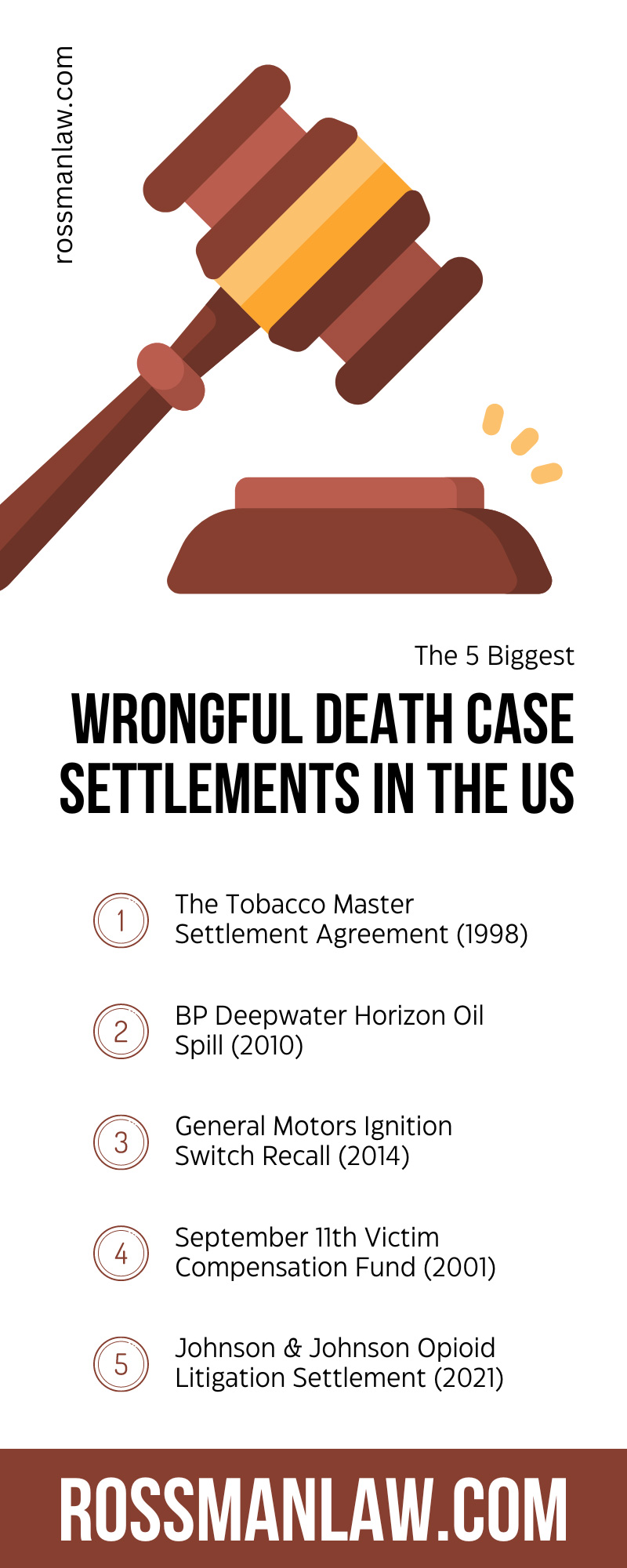
When Is Touching in the Workplace Considered Harassment?
April 4, 2024
Are Labor Laws Different for Salaried Employees?
April 12, 2024Wrongful death settlements in the United States serve as stark reminders of the human cost behind legal battles and headline-grabbing figures. These cases emerge from circumstances ranging from medical malpractice to corporate negligence and flawed safety protocols. They result in financial restitution for grieving families and often drive significant societal and legal reforms. The biggest wrongful death case settlements in the US have spurred changes in industry standards, inspired new legislation, and heightened public awareness around critical safety and ethical issues.
Let’s take a closer look at some of the most impactful wrongful death settlements across the country and examine the stories behind the numbers. Each case involves a unique narrative of loss, perseverance, and the quest for justice, highlighting the power of the legal system to enact change.
The Tobacco Master Settlement Agreement (1998)
The late twentieth century saw the culmination of decades-long legal battles against the tobacco industry, leading to the monumental Tobacco Master Settlement Agreement (MSA) in 1998. This agreement was between the four largest tobacco companies in the United States—Philip Morris Inc., R.J. Reynolds, Brown & Williamson, and Lorillard—and the attorneys general of 46 states. The states sought recovery for the healthcare costs associated with treating smoking-related illnesses.
The settlement required the tobacco industry to pay $206 billion over the first 25 years of the agreement and continue payments beyond that period based on cigarette sales. The MSA also imposed significant restrictions on the advertising, marketing, and promotion of cigarettes. For instance, it banned cartoon characters from advertisements, prohibited billboard advertising near schools, and ended branded merchandise. This landmark settlement represented a massive financial blow to the tobacco industry and marked a critical shift in public health policy and awareness regarding the dangers of smoking.
BP Deepwater Horizon Oil Spill (2010)
The Deepwater Horizon oil spill disaster in 2010, which released millions of barrels of oil into the Gulf of Mexico, led to one of the largest environmental lawsuits in US history. BP, the company responsible for the spill, agreed to create a $20 billion fund to compensate victims for their losses. That compensation included wrongful death claims from the families of the 11 workers who died in the explosion associated with the spill.
Additionally, BP faced fines and settlements totaling tens of billions more, including a record $18.7 billion settlement in 2015 to resolve claims from the US government and five Gulf states. The settlements covered environmental restoration, economic damages to the Gulf states, and penalties under the Clean Water Act. This case underscored the importance of corporate accountability for environmental disasters and led to significant changes in offshore drilling regulations.
General Motors Ignition Switch Recall (2014)
General Motors (GM) faced a crisis when it was discovered that a faulty ignition switch in some of its small cars could cause the engine to shut off while driving. The shutoff often disabled safety systems, including airbags. The defect was linked to at least 124 deaths and many more injuries.
In response to the ensuing public outcry and legal action, GM established a compensation fund for victims and their families, offering settlements for those affected by the defect. The company admitted to knowing about the problem for over a decade before initiating a recall in 2014. GM’s compensation fund ultimately paid out millions to victims’ families, with settlements for deaths starting at $1 million.
The scandal led to congressional hearings, federal investigations, and a $900 million settlement between GM and the Department of Justice over failing to disclose the defect. It highlighted the critical need for transparency and swift action in addressing potential safety hazards in the automotive industry.
If you suffer a tragic loss due to faulty or unsafe equipment, contact a wrongful death attorney in Boise, Idaho, to discuss your options. A wrongful death suit may win you valuable compensation.
September 11th Victim Compensation Fund (2001)
Following the terrorist attacks on September 11, 2001, Congress quickly enacted the Air Transportation Safety and System Stabilization Act, establishing the September 11th Victim Compensation Fund (VCF). The VCF was designed to provide compensation to those killed or injured in the attacks and to the families of the deceased.
Administered by Special Master Kenneth Feinberg, the fund awarded $7 billion in total compensation, with the average payment for a death claim around $2 million. The VCF represented an unprecedented use of taxpayer funds to compensate individuals for a terrorist attack, circumventing potential litigation against the airlines and the government. It highlighted the challenges of valuing human life and addressed the need for support and closure for the families affected by the tragedy.
Johnson & Johnson Opioid Litigation Settlement (2021)
Recently, Johnson & Johnson and three other pharmaceutical distributors agreed to pay $26 billion to settle claims that they contributed to the opioid epidemic in the United States. It’s one of the most significant settlements related to wrongful death. This settlement, announced in 2021, aims to resolve thousands of lawsuits filed by states, cities, and Native American nations alleging that the companies’ practices led to widespread opioid addiction and overdose deaths.
The funds from the settlement are intended to support opioid treatment and prevention programs. This case is part of a larger wave of litigation targeting the pharmaceutical industry’s role in the opioid crisis. Legal experts are seeking accountability for companies accused of downplaying the risks of addiction and oversupplying the market with powerful painkillers.
Reflecting on these landmark wrongful death case settlements in the US, we see more than just the financial figures. There are stories of tragic loss and indelible human cost behind these numbers. These settlements underscore a crucial societal message—the need for preventive measures to avoid such tragedies altogether.
The significant amounts involved in these cases highlight the impact of negligence and corporate misconduct on human lives. They also signal a call for broader societal shifts regarding safer practices, environmental responsibility, public health, and ethical corporate governance. Each resolved case brings closure to affected families and acts as a catalyst for industry-wide changes and tighter regulations.
Furthermore, these settlements showcase the strength of collective action and the legal system as tools for justice and progress. They illustrate how laws can challenge powerful entities, drive reforms, and foster positive societal transformations.






